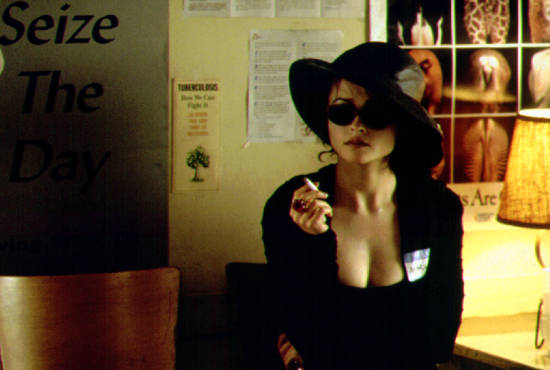Before I begin, let me just say this. Yes, I LOVED Fight Club, I think it's one of the dopest movies ever made. I enjoyed watching it, I enjoyed the way the storyline unfolded. I enjoyed the way Helene Bonham Carter played the eccentric Marla Singer to perfection. I enjoyed Brad Pitt's half-naked body. I enjoyed the wonderfully-nuanced performance Ed Norton gave (yeah, I think he's sexy too). So, after reading the book a while ago and reading Chuck Palahnuik's afterword in which he lists the innumerable ways in which pop culture has assimilitated the movie and turned into something of a modern-film classic.
But why does the vision of a place where men can go to vent their frustrations with life through physical brutality hold so much appeal. Why is this an image that is so seductive? In my mind, much of this has got to do with quite obvious patriarchal definitions of masculinity. Built along the lines of a capitalist mentality which asserts that manliness is reinforced by one's ability to bring home the meat, Fight Club paints the picture of a man who is frustrated mainly as a result of his failure to live up to the very standards that a capitalist society maintains. In escaping from a life of materialism and choosing to live simply, Tyler Durden attempts to escape the pressures of a life built on the importance of accumulating possessions but chooses instead a life through which violence offers enrichment and fulfillment. The will to do violent acts is instrinsic, I believe, in this same patriarchal notion of being a man that Fight Club does nothing more than show us a young white male caught up stuck in much the same way men find themselves stuck and unable to escape the pressures placed on them to live up to the standard of manliness that society insists on maintaining. In that regard, whether Palahnuik offers his character any sort of escape or not (in the book, he ends up in a mental institution), he does a very good job in holding up a mirror to the ways in which capitalist patriarchy operates on the individual psychological level. These are men who seek to reclaim a false notion of masculinity they believe they cannot achieve through violence - they work regular jobs living pay-check to pay-check & grew up in homes where fathers were absent - Fight Club serves as their escape from these numerous castrations they believe life has performed on them. Unyet if only the their mindsets would change, if the definition of masculinity was not based on the same old tired patriarchal ideas, these men would find salvation from their own self-inflicted torture - of absorbing the notion that they have failed to live up to the standard.
It's because of Fight Club's ability to raise this important aspect about the ways in which society's built capitalism create a people who imagine that a life of seeking possessions and wealth is a life well-lived and the story's commentary on how this very society informs gender-expectations that make it a modern-day classic. Beside the twist at the end of the movie that got me so good, I had to stand up for a minute and take a breath, it's a a story that speaks volumes about the tyrannical nature of a white supremacist capitalist patriarchal system (as bell hooks so aptly describes it).




No comments:
Post a Comment